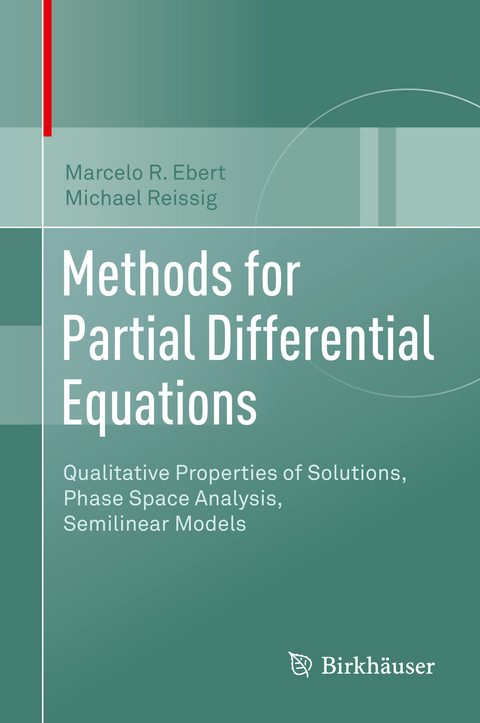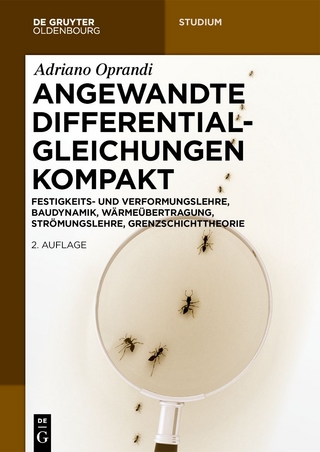
Methods for Partial Differential Equations
Springer International Publishing (Verlag)
9783319664552 (ISBN)
This book provides an overview of different topics related to the theory of partial differential equations. Selected exercises are included at the end of each chapter to prepare readers for the "research project for beginners" proposed at the end of the book. It is a valuable resource for advanced graduates and undergraduate students who are interested in specializing in this area.
The book is organized in five parts:
In Part 1 the authors review the basics and the mathematical prerequisites, presenting two of the most fundamental results in the theory of partial differential equations: the Cauchy-Kovalevskaja theorem and Holmgren's uniqueness theorem in its classical and abstract form. It also introduces the method of characteristics in detail and applies this method to the study of Burger's equation.
Part 2 focuses on qualitative properties of solutions to basic partial differential equations, explaining the usual properties of solutions to elliptic, parabolic and hyperbolic equations for the archetypes Laplace equation, heat equation and wave equation as well as the different features of each theory. It also discusses the notion of energy of solutions, a highly effective tool for the treatment of non-stationary or evolution models and shows how to define energies for different models.
Part 3 demonstrates how phase space analysis and interpolation techniques are used to prove decay estimates for solutions on and away from the conjugate line. It also examines how terms of lower order (mass or dissipation) or additional regularity of the data may influence expected results.
Part 4 addresses semilinear models with power type non-linearity of source and absorbing type in order to determine critical exponents: two well-known critical exponents, the Fujita exponent and the Strauss exponent come into play. Depending on concrete models these critical exponents divide the range of admissible powers in classes which make it possible toprove quite different qualitative properties of solutions, for example, the stability of the zero solution or blow-up behavior of local (in time) solutions.
The last part features selected research projects and general background material.
Marcelo Rempel Ebert (1977) is an Associate Professor at the Department of Computing and Mathematics at the University of São Paulo (USP). He obtained his Ph.D. degree in 2004 from Federal University of São Carlos, Brazil. His original contributions are mainly devoted to Evolution partial differential equations, in particular, questions related to the asymptotic behaviour and global existence of solutions for the Cauchy problem to semilinear wave equations. Michael Gerhard Reissig (1958) is Professor for Partial Differential Equations at the Institute of Applied Analysis of the Technical University Bergakademie Freiberg. He obtained the degree Dr.rer.nat. in 1987, Dr.sc. in 1991 and Dr.habil. in 1992. His main contributions are devoted to the abstract Cauchy-Kovalevskaja theory, to Hele-Shaw flows, to elliptic equations, hyperbolic equations and Schrödinger equations as well.
Part 1.- Introduction.- Part 2.- Partial differential equations in models.- Basics for partial differential equations.- The Cauchy-Kovalevskaja theorem.- Holmgren's uniqueness theorem.- Method of characteristics.- Burger's equation.- Laplace equation - properties of solutions - starting point of elliptic theory.- Heat equation - properties of solutions - starting point of parabolic theory.- Wave equation - properties of solutions - starting point of hyperbolic theory.- Energies of solutions - one of the most important quantities.- Part 3.- Phase space analysis for heat equation.- Phase space analysis and smoothing for Schrödinger equations.- Phase space analysis for wave models.- Phase space analysis for plate models.- The method of stationary phase and applications.- Part 4.- Semilinear heat models.- Semilinear classical damped wave models.- Semilinear wave models with a special structural dissipation.- Semilinear classical wave models.- Semilinear Schrödinger models.- Linear hyperbolic systems.- Part 5.- Research projects for beginners.- Background material.
"This is a self-contained monograph on the theory of partial differential equations, mainly oriented for nonlinear hyperbolic and dispersive equations and systems. ... This monograph is totally a good introduction to the beginners of the study of partial differential equations, particularly to whom are interested in wave and dispersive equations and systems." (Takashi Suzuki, zbMATH 1503.35003, 2023)
"This book contains both a careful presentation of several important theoretic notions and properties but also a selection of well-chosen exercises at the end of each chapter. ... The exposition is flexible enough to allow substantial changes in the presentation of the arguments without compromising comprehension ... . this volume is a valuable resource for advanced undergraduate and graduate students ... . This book may also be useful for Ph.D. students or for special courses or seminars." (Vicentiu D. Radulescu, Mathematical Reviews, October, 2018)
| Erscheinungsdatum | 19.03.2018 |
|---|---|
| Zusatzinfo | XVI, 456 p. 1 illus. |
| Verlagsort | Cham |
| Sprache | englisch |
| Maße | 155 x 235 mm |
| Gewicht | 906 g |
| Themenwelt | Mathematik / Informatik ► Mathematik ► Analysis |
| Schlagworte | absorbing non-linearity • blow-up behavior • Differential calculus & equations • Differential calculus & equations • energy method • global existence of small data solutions • Hyperbolic systems • Mathematics • mathematics and statistics • Partial differential equations • Potential Theory • regularity results • source non-linearity • well-posedness of mixed problems and Cauchy proble • well-posedness of mixed problems and Cauchy problems |
| ISBN-13 | 9783319664552 / 9783319664552 |
| Zustand | Neuware |
| Informationen gemäß Produktsicherheitsverordnung (GPSR) | |
| Haben Sie eine Frage zum Produkt? |
aus dem Bereich


